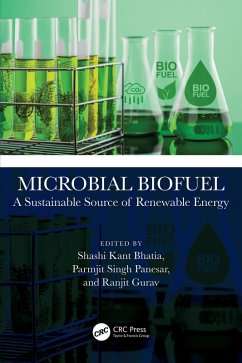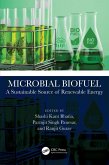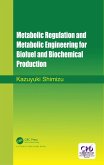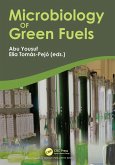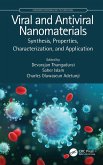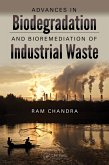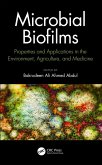Microbial Biofuel (eBook, ePUB)
A Sustainable Source of Renewable Energy
Redaktion: Bhatia, Shashi Kant; Gurav, Ranjit; Panesar, Parmjit Singh
52,95 €
52,95 €
inkl. MwSt.
Erscheint vor. 07.03.25

26 °P sammeln
52,95 €
Als Download kaufen

52,95 €
inkl. MwSt.
Erscheint vor. 07.03.25

26 °P sammeln
Jetzt verschenken
Alle Infos zum eBook verschenken
52,95 €
inkl. MwSt.
Erscheint vor. 07.03.25
Alle Infos zum eBook verschenken

26 °P sammeln
Unser Service für Vorbesteller - Ihr Vorteil ohne Risiko:
Sollten wir den Preis dieses Artikels vor dem Erscheinungsdatum senken, werden wir Ihnen den Artikel bei der Auslieferung automatisch zum günstigeren Preis berechnen.
Sollten wir den Preis dieses Artikels vor dem Erscheinungsdatum senken, werden wir Ihnen den Artikel bei der Auslieferung automatisch zum günstigeren Preis berechnen.
Microbial Biofuel (eBook, ePUB)
A Sustainable Source of Renewable Energy
Redaktion: Bhatia, Shashi Kant; Gurav, Ranjit; Panesar, Parmjit Singh
- Format: ePub
- Merkliste
- Auf die Merkliste
- Bewerten Bewerten
- Teilen
- Produkt teilen
- Produkterinnerung
- Produkterinnerung

Bitte loggen Sie sich zunächst in Ihr Kundenkonto ein oder registrieren Sie sich bei
bücher.de, um das eBook-Abo tolino select nutzen zu können.
Hier können Sie sich einloggen
Hier können Sie sich einloggen
Sie sind bereits eingeloggt. Klicken Sie auf 2. tolino select Abo, um fortzufahren.

Bitte loggen Sie sich zunächst in Ihr Kundenkonto ein oder registrieren Sie sich bei bücher.de, um das eBook-Abo tolino select nutzen zu können.
Microbial Biofuel: A Sustainable Source of Renewable Energy explores microbial biofuel production from a technical standpoint addressing a wide range of topics including bio alcohol, biodiesel, biohydrogen, biomethane, biohythane, jet fuel, drop-in fuel, bioelectricity, bio-oil, biomass to biofuel, carbon capture, and more.
- Geräte: eReader
- mit Kopierschutz
- eBook Hilfe
- Größe: 19.33MB
Andere Kunden interessierten sich auch für
![Microbial Biofuel (eBook, PDF) Microbial Biofuel (eBook, PDF)]() Microbial Biofuel (eBook, PDF)52,95 €
Microbial Biofuel (eBook, PDF)52,95 €![Metabolic Regulation and Metabolic Engineering for Biofuel and Biochemical Production (eBook, ePUB) Metabolic Regulation and Metabolic Engineering for Biofuel and Biochemical Production (eBook, ePUB)]() Kazuyuki ShimizuMetabolic Regulation and Metabolic Engineering for Biofuel and Biochemical Production (eBook, ePUB)49,95 €
Kazuyuki ShimizuMetabolic Regulation and Metabolic Engineering for Biofuel and Biochemical Production (eBook, ePUB)49,95 €![Microbiology of Green Fuels (eBook, ePUB) Microbiology of Green Fuels (eBook, ePUB)]() Microbiology of Green Fuels (eBook, ePUB)52,95 €
Microbiology of Green Fuels (eBook, ePUB)52,95 €![Signaling Through Cell Adhesion Molecules (eBook, ePUB) Signaling Through Cell Adhesion Molecules (eBook, ePUB)]() Jun-Lin GuanSignaling Through Cell Adhesion Molecules (eBook, ePUB)52,95 €
Jun-Lin GuanSignaling Through Cell Adhesion Molecules (eBook, ePUB)52,95 €![Viral and Antiviral Nanomaterials (eBook, ePUB) Viral and Antiviral Nanomaterials (eBook, ePUB)]() Viral and Antiviral Nanomaterials (eBook, ePUB)52,95 €
Viral and Antiviral Nanomaterials (eBook, ePUB)52,95 €![Advances in Biodegradation and Bioremediation of Industrial Waste (eBook, ePUB) Advances in Biodegradation and Bioremediation of Industrial Waste (eBook, ePUB)]() Advances in Biodegradation and Bioremediation of Industrial Waste (eBook, ePUB)50,95 €
Advances in Biodegradation and Bioremediation of Industrial Waste (eBook, ePUB)50,95 €![Microbial Biofilms (eBook, ePUB) Microbial Biofilms (eBook, ePUB)]() Microbial Biofilms (eBook, ePUB)52,95 €
Microbial Biofilms (eBook, ePUB)52,95 €-
-
-
Microbial Biofuel: A Sustainable Source of Renewable Energy explores microbial biofuel production from a technical standpoint addressing a wide range of topics including bio alcohol, biodiesel, biohydrogen, biomethane, biohythane, jet fuel, drop-in fuel, bioelectricity, bio-oil, biomass to biofuel, carbon capture, and more.
Dieser Download kann aus rechtlichen Gründen nur mit Rechnungsadresse in A, B, BG, CY, CZ, D, DK, EW, E, FIN, F, GR, HR, H, IRL, I, LT, L, LR, M, NL, PL, P, R, S, SLO, SK ausgeliefert werden.
Produktdetails
- Produktdetails
- Verlag: Taylor & Francis eBooks
- Erscheinungstermin: 7. März 2025
- Englisch
- ISBN-13: 9781040304761
- Artikelnr.: 73341286
- Verlag: Taylor & Francis eBooks
- Erscheinungstermin: 7. März 2025
- Englisch
- ISBN-13: 9781040304761
- Artikelnr.: 73341286
- Herstellerkennzeichnung Die Herstellerinformationen sind derzeit nicht verfügbar.
Shashi Kant Bhatia is Associate Professor in the Department of Biological Engineering, Konkuk University, Seoul, South Korea, and has more than ten years' experience in biowaste valorization into bioenergy, biochemicals, and biomaterials. He holds an MSc and a PhD in biotechnology from Himachal Pradesh University (India). Dr. Bhatia has worked as a Brain Pool Post Doc Fellow at Konkuk University (2014-2016) and has contributed extensively to the industrial press and served as an editorial board member of the Sustainability and Energies journals and an associate editor of Frontier of Microbiology, Microbial Cell Factories, Biomass Conversion and Biorefinery , Bioprocess and Biosystems Engineering, Carbohydrate Technology and Applications, 3 Biotech, and PLOS One journals. He is Editor in Chief of the Biotechnology for Sustainable Materials journal. He has published more than 200 research and review articles on industrial biotechnology, bioenergy production, biomaterial, biotransformation, microbial fermentation, and enzyme technology in international scientific peer-reviewed journals and holds 15 international patents. He has also edited four books on microbial biotechnology. Dr. Bhatia has successfully supervised and completed three projects funded by NRF Korea ($600,000). Parmjit S. Panesar is working as Professor at Sant Longowal Institute of Engineering and Technology, Longowal, Punjab, India. Panesar has also worked as Dean (Research and Consultancy) and Head of the Department of Food Engineering & Technology, SLIET Longowal, India. His research is focused on the area of Food Biotechnology, especially bioprocessing of food industry by-products, food enzymes, prebiotics (lactulose, GOS), biopigments, etc. In 2005, he was awarded a BOYSCAST (Better Opportunities for Young Scientists in Chosen Areas of Science and Technology) fellowship by the Department of Science & Technology (DST), Government of India, to carry out advanced research at Chembiotech labs, University of Birmingham Research Park, UK. Professor Panesar has successfully completed seven research projects funded by DBT, CSIR, MHRD, AICTE, and New Delhi and 20 projects are in progress. He has published more than 200 international/national scientific papers, 50 book reviews in peer-reviewed journals, and 32 chapters and has authored/edited 16 books. He has guided 19 PhD students and eight students are under progress. He is a member of the editorial advisory boards of national/international journals including the International Journal of Biological Macromolecules, Journal of Food Science & Technology, and Carbohydrate Polymer Technologies & Applications . In recognition of his work, Panesar was awarded the 2018 Fellow Award by the Biotech Research Society of India (BRSI) and the 2019 Fellow Award by the National Academy of Dairy Science India (NADSI). He was also selected for the award of prestigious INSA Teachers Award by the Indian National Science Academy (INSA) in 2020. He has served as the National Vice President of the Association of Food Scientists & Technologists of India (AFSTI) in 2019. He has also visited several countries like the UK, the USA, Canada, Switzerland, New Zealand, Australia, Germany, France, Singapore, Malaysia, China, Iran, and Thailand. Ranjit Gurav is Associate Professor at UPES Dehradun, India. He received his PhD in Biotechnology in 2013 and has since conducted extensive research for a decade in various countries, including the USA, South Korea, India, and China. Throughout his career, he has held roles such as associate professor, research professor, assistant professor, postdoctoral research associate, and young scientist, contributing significantly to advancements in his field. His research primarily focuses on harnessing agriculture and food industry waste biomass, and by-products to produce bioelectricity, polyhydroxyalkanoates, biodiesel, exopolysaccharides, and biohydrogen. Dr. Gurav is highly skilled in implementing microbial, bioelectrochemical, hydrogel, biochar, and self-activated carbon-based technologies for the remediation of organic contaminants and heavy metals in water and soil. Using a microbial system, he has established a unique technology for converting poultry feather biomass into a growth stimulator, and chitin biomass into an antifungal agent. In addition, he developed green infrastructure to manage urban stormwater runoff through biologically active pervious structures. Gurav has secured research funding totalling $100,000 from organizations such as the NSF I-Corps of the United States, FIAP of Texas State University, and DST-SERB of India. Gurav is deeply involved in the academic community, serving as an associate editor, academic editor, topical editor, and editor for ten international journals and reviewer for over 70 international journals. He holds life memberships with the Biotech Research Society of India and the Association of Microbiologists of India.
Contents
About the Editors
List of Contributors
Preface
Chapter 1: Introduction to microbial biofuels: Nature's solution to energy
sustainability
Shashi Kant Bhatia, Parmjit S. Panesar and Ranjit Gurav
Chapter 2: Bioalcohol production: Fermenting nature's bounty into liquid
gold
Naimi Sirjohn, Ravi Kant Bhatia and Pradeep Kumar
Chapter 3: Biodiesel production: Microbial alchemy for sustainable
transportation
Falak Shaheen, Rohit Topkar, Ranjit Gurav, Yung-Hun Yang, Jyoti Jadhav and
Rahul Jadhav
Chapter 4: Biohydrogen production: Harnessing microbes for clean energy
generation
Rohit Topkar, Anmol Patil, Priyanka Magadum, Sarita Wadmare, Ranjit Gurav,
Sangchul Hwang, Jyoti Jadhav and Rahul Jadhav
Chapter 5: Biomethane production: From organic waste to green gas
Ying Xu and Chen Zhang
Chapter 6: Biohythane production: Merging biohydrogen and biomethane for a
sustainable future
Paramjeet Dhull, Neha Saini, Sugandhi and Sachin Kumar
Chapter 7: Bioelectricity generation: Powering the future with microbial
fuel cells
Rajee Olaganathan
Chapter 8: Drop-in fuel production: Transforming biomass into
next-generation fuels
Eunice O. Babatunde, Yura Kim and Sujata Mandal
Chapter 9: Bioelectricity generation: Powering the future with microbial
fuel cells
Akansha Mohanty, Siddhika Ajmera, Yash Misra, Ranjeet Kumar Mishra, D.
Jaya, Prasanna Kumar and Ravi Sankannavar
Chapter 10: Bio-oil production: Unlocking the liquid fuel potential of
biomass
Ahmad Nawaz, Hayat Ali Haddad, Ayah Stif and Shaikh Abdur Razzak
About the Editors
List of Contributors
Preface
Chapter 1: Introduction to microbial biofuels: Nature's solution to energy
sustainability
Shashi Kant Bhatia, Parmjit S. Panesar and Ranjit Gurav
Chapter 2: Bioalcohol production: Fermenting nature's bounty into liquid
gold
Naimi Sirjohn, Ravi Kant Bhatia and Pradeep Kumar
Chapter 3: Biodiesel production: Microbial alchemy for sustainable
transportation
Falak Shaheen, Rohit Topkar, Ranjit Gurav, Yung-Hun Yang, Jyoti Jadhav and
Rahul Jadhav
Chapter 4: Biohydrogen production: Harnessing microbes for clean energy
generation
Rohit Topkar, Anmol Patil, Priyanka Magadum, Sarita Wadmare, Ranjit Gurav,
Sangchul Hwang, Jyoti Jadhav and Rahul Jadhav
Chapter 5: Biomethane production: From organic waste to green gas
Ying Xu and Chen Zhang
Chapter 6: Biohythane production: Merging biohydrogen and biomethane for a
sustainable future
Paramjeet Dhull, Neha Saini, Sugandhi and Sachin Kumar
Chapter 7: Bioelectricity generation: Powering the future with microbial
fuel cells
Rajee Olaganathan
Chapter 8: Drop-in fuel production: Transforming biomass into
next-generation fuels
Eunice O. Babatunde, Yura Kim and Sujata Mandal
Chapter 9: Bioelectricity generation: Powering the future with microbial
fuel cells
Akansha Mohanty, Siddhika Ajmera, Yash Misra, Ranjeet Kumar Mishra, D.
Jaya, Prasanna Kumar and Ravi Sankannavar
Chapter 10: Bio-oil production: Unlocking the liquid fuel potential of
biomass
Ahmad Nawaz, Hayat Ali Haddad, Ayah Stif and Shaikh Abdur Razzak
Contents
About the Editors
List of Contributors
Preface
Chapter 1: Introduction to microbial biofuels: Nature's solution to energy
sustainability
Shashi Kant Bhatia, Parmjit S. Panesar and Ranjit Gurav
Chapter 2: Bioalcohol production: Fermenting nature's bounty into liquid
gold
Naimi Sirjohn, Ravi Kant Bhatia and Pradeep Kumar
Chapter 3: Biodiesel production: Microbial alchemy for sustainable
transportation
Falak Shaheen, Rohit Topkar, Ranjit Gurav, Yung-Hun Yang, Jyoti Jadhav and
Rahul Jadhav
Chapter 4: Biohydrogen production: Harnessing microbes for clean energy
generation
Rohit Topkar, Anmol Patil, Priyanka Magadum, Sarita Wadmare, Ranjit Gurav,
Sangchul Hwang, Jyoti Jadhav and Rahul Jadhav
Chapter 5: Biomethane production: From organic waste to green gas
Ying Xu and Chen Zhang
Chapter 6: Biohythane production: Merging biohydrogen and biomethane for a
sustainable future
Paramjeet Dhull, Neha Saini, Sugandhi and Sachin Kumar
Chapter 7: Bioelectricity generation: Powering the future with microbial
fuel cells
Rajee Olaganathan
Chapter 8: Drop-in fuel production: Transforming biomass into
next-generation fuels
Eunice O. Babatunde, Yura Kim and Sujata Mandal
Chapter 9: Bioelectricity generation: Powering the future with microbial
fuel cells
Akansha Mohanty, Siddhika Ajmera, Yash Misra, Ranjeet Kumar Mishra, D.
Jaya, Prasanna Kumar and Ravi Sankannavar
Chapter 10: Bio-oil production: Unlocking the liquid fuel potential of
biomass
Ahmad Nawaz, Hayat Ali Haddad, Ayah Stif and Shaikh Abdur Razzak
About the Editors
List of Contributors
Preface
Chapter 1: Introduction to microbial biofuels: Nature's solution to energy
sustainability
Shashi Kant Bhatia, Parmjit S. Panesar and Ranjit Gurav
Chapter 2: Bioalcohol production: Fermenting nature's bounty into liquid
gold
Naimi Sirjohn, Ravi Kant Bhatia and Pradeep Kumar
Chapter 3: Biodiesel production: Microbial alchemy for sustainable
transportation
Falak Shaheen, Rohit Topkar, Ranjit Gurav, Yung-Hun Yang, Jyoti Jadhav and
Rahul Jadhav
Chapter 4: Biohydrogen production: Harnessing microbes for clean energy
generation
Rohit Topkar, Anmol Patil, Priyanka Magadum, Sarita Wadmare, Ranjit Gurav,
Sangchul Hwang, Jyoti Jadhav and Rahul Jadhav
Chapter 5: Biomethane production: From organic waste to green gas
Ying Xu and Chen Zhang
Chapter 6: Biohythane production: Merging biohydrogen and biomethane for a
sustainable future
Paramjeet Dhull, Neha Saini, Sugandhi and Sachin Kumar
Chapter 7: Bioelectricity generation: Powering the future with microbial
fuel cells
Rajee Olaganathan
Chapter 8: Drop-in fuel production: Transforming biomass into
next-generation fuels
Eunice O. Babatunde, Yura Kim and Sujata Mandal
Chapter 9: Bioelectricity generation: Powering the future with microbial
fuel cells
Akansha Mohanty, Siddhika Ajmera, Yash Misra, Ranjeet Kumar Mishra, D.
Jaya, Prasanna Kumar and Ravi Sankannavar
Chapter 10: Bio-oil production: Unlocking the liquid fuel potential of
biomass
Ahmad Nawaz, Hayat Ali Haddad, Ayah Stif and Shaikh Abdur Razzak
